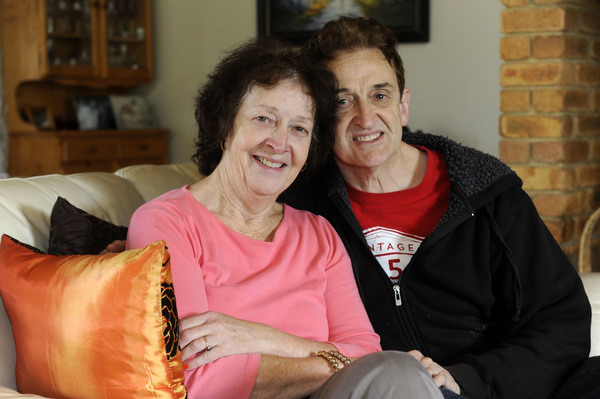
By KATHRYN BERMINGHAM
Of the 342,800 Australians living with dementia, 25,100 are under the age of 65. Narre Warren’s Jenny Lloyd has early-onset posterior cortical atrophy, a strain of Alzheimer’s disease. She and her husband Garry shared their story with KATHRYN BERMINGHAM
IT STARTED with little things. Upside-down words, repeated questions or difficulty in completing household tasks.
Then came the car accidents. Jenny Lloyd’s brain was working like it did before, and it was becoming a concern for her and husband Garry.
Jenny had beaten cancer some years earlier and had then been diagnosed with depression – perhaps these new symptoms were related.
“We went to see the local doctor and said we need some tests done,” Garry recalls.
“They did blood tests, different scans, brain testing, sleep apnoea tests, we saw a psychologist and a psychiatrist. It was about six months before they came back with dementia.”
Jen was diagnosed with posterior cortical atrophy – a variant of Alzheimer’s disease typically surfacing at an earlier age.
“With this type, from some reason the brain blocks out certain things, so she won’t see things,” Garry says.
The syndrome affects a person’s visual processing abilities due to the atrophy of the cerebral cortex, explaining many of Jenny’s symptoms.
Following the diagnosis, dementia crept into the lives of Garry and Jenny in unsuspecting ways, sometimes catching them off guard.
“Jen was at Coles one day and tried to pay with coins and she couldn’t work out the coins so the girl refused to serve her,” Garry said.
“So we’ve got things like PayWave now and she doesn’t have to worry, but things like that are pretty upsetting.”
A particularly difficult area is maths, reasoning and calculations. Tasks that were once second nature were becoming a challenge.
“Jen has a lot of trouble organising things, so she was increasingly having more trouble cooking meals,” he said.
“She might have the potatoes done, the carrots would be done an hour later and the meat an hour after that.
“Getting things to match is quite a difficult task.
The nature of dementia brings with it certain challenges, and the couple find that friends and family have difficulty understanding the situation.
“People don’t understand. Most people just think it’s memory loss,” he said.
“We probably don’t’ catch up with our friends as much anymore because it’s just too hard for them.
“A lot of people avoid us which is difficult.”
It’s been hard for their three adult daughters too, although Gary says they are coming to terms with their mum’s illness.
“You don’t expect your parents to be like this. You don’t want your parents to be sick and that’s hard.”
However, Jenny says it’s Garry who has had to adapt most following the diagnosis.
“Garry’s probably copped most of it. The girls are good and we’ve started getting a cleaner to come in.”
Much of their energy is devoted on making life as easy as possible as a method of coping.
“Jen finds it harder to do things so we try and take the stress out of it,” Garry said.
“When there’s pressure on she struggles, she copes well when she doesn’t have to worry and think about everything.”
Life’s a bit slower for Garry and Jen these days. Although she can’t drive, Jen still enjoys gardening and attends a painting class every week.
“It’s something I really enjoy doing. All the people in the class have Parkinson’s disease, it’s very therapeutic.”
There are 25,100 Australians under the age of 65 who are living with dementia.
Alzheimer’s Australia reports that, on average, symptoms of dementia are noticed by families three years before a firm diagnosis is made.
“Everyone expects to get a little bit of dementia as they get older but no-one expects it when they’re younger than 65. You get very young people being diagnosed, it’s a nasty thing,” Garry says.
Garry and Jenny find it challenging to navigate a system designed for older people.
“Everything’s geared for older people. So when you talk to the council they say ‘well, if you were 65 then we could do this and this and this’,” Garry says.
“We’re just outside of all the thresholds. Every time I fill in a form I get to the end and it says we don’t meet the requirements.”
September is Dementia Awareness Month, an initiative of Alzheimer’s Australia to create a dementia-friendly nation.
Garry’s message to anyone concerned about themselves or their loved ones would be to seek help.
“If something’s wrong, don’t ignore it. Get tested and get help. You can certainly live with dementia.”
For more information or support, call the National Dementia Helpline on 1800 100 500.






